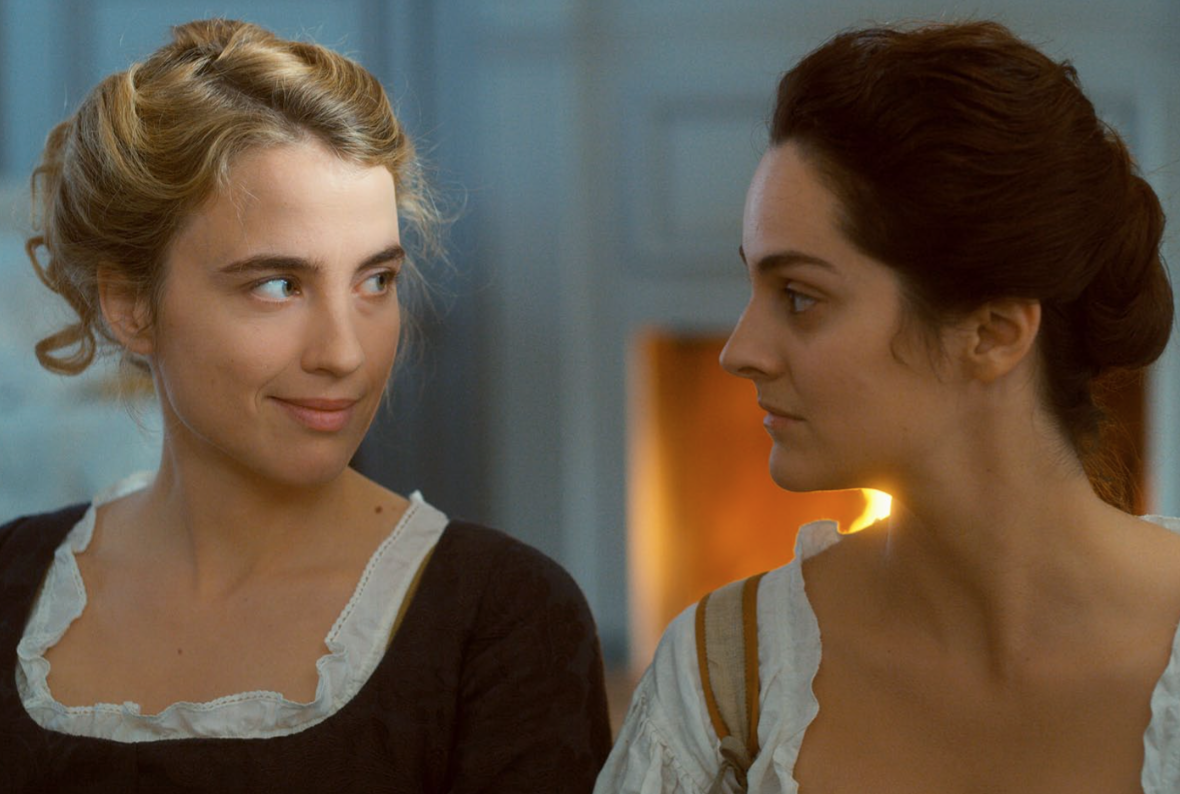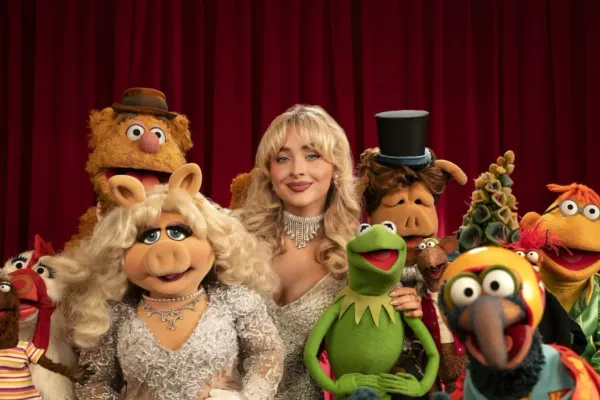Learning to see
Why do we watch movies and television anyway?

There’s an early shot in Céline Sciamma’s Portrait of a Lady on Fire that made me realize it was going to be one of my very favorite films.
The movie centers on a young painter named Marianne, who has gone to an isolated manor in the late 1700s to paint a portrait of Héloïse, a rich young woman. The portrait is meant to interest a man in far-off Milan in marrying Héloïse, even though he’s never met her. Héloïse refused to sit for the last artist who came to the house, which leaves an almost ghostly unfinished portrait in the room where Marianne sets up her painting tools — a woman’s body, with a void where a head should be.
The reason Marianne has been hired is so she might go on walks with Héloïse and endear herself to the other woman, the better to paint her from memory when she settles down to work at night. But it will come as no surprise to you that the bond between the two women grows, turning into a friendship and then flirting with becoming something more. And what’s intoxicating about the way this attraction intersects with the premise is that Marianne cannot stop looking at Héloïse because that’s explicitly her job. She needs to be able to paint the woman, after all. Those looks carry the weight of the story on them, which is why it’s important that every single frame is chosen with great specificity.

The shot I was talking about above comes in the sequence after Marianne first meets Héloïse. Sciamma takes great pains not to reveal Héloïse’s face to the audience until Marianne sees it as well, and Héloïse is very good at not being seen. First there’s that ghostly portrait. Then, when it’s time for the two’s first walk, Héloïse comes down in a great blue cape with a hood that she draws up around her face. She walks very quickly, all but daring Marianne to keep up.
As Marianne trots along behind her, the camera takes on her point-of-view, and we watch as the hood slowly falls from Héloïse’s head, revealing her blonde hair. We still have yet to see her face, as has Marianne. But we are so close, and there’s something so tantalizing about the way she walks right in front of us. Yet what the shot conveys is not desire, not precisely, even though Marianne will become attracted to Héloïse and Héloïse is actually played by Sciamma’s long-time partner, Adèle Haenel. What it conveys is longing, yes, but longing to know and to be seen.
It rocked me back on my heels. As a woman attracted to women, but a woman who only realized that about herself later than most, I suddenly had learned how to see through my own eyes again. The shot felt like a memory more than it did something I was watching on screen, a resurfaced dream of some time when I, walking quickly through the city, suddenly found myself behind a woman who carried herself in such a way that I longed to know more about her. But it’s only been recently that other women have begun relating to me as a woman. For most of my life, if I tried to catch up to a woman walking in front of me, it would have been perceived as a threat.
We talk, often, about the idea that the movies and television can help us empathize and understand each other. Roger Ebert frequently talked about this quality of films, including in his remarks during his receiving of a star on the Hollywood Walk of Fame, when he said:
Movies are the most powerful empathy machine in all the arts. When I go to a great movie I can live somebody else's life for a while. I can walk in somebody else's shoes. I can see what it feels like to be a member of a different gender, a different race, a different economic class, to live in a different time, to have a different belief.
Ebert’s statement is true. To watch a movie or TV show that depicts a life vastly different from your own is a wonderful way to understand people who are very unlike you. When the wonderful Iranian director Ashgar Farhadi became the first person from Iran to win a Foreign Language Film Oscar (for his brilliant film A Separation), there was some discussion of whether the increased prominence of his films might help Americans see that Iranians were people like any others. That’s how much we want to believe in film and TV’s ability to change our lives, all evidence to the contrary.
But there’s another thing the movies and TV can do: They can remind us how to see through our own eyes. I have spent the last several months trying to relocate my sexuality in the wake of beginning hormone replacement therapy. (It’s not uncommon for one’s sexuality to wander off for a bit while the brain figures itself out.) But seeing the back of Haenel’s head through Sciamma’s camera reminded me of a person I had always been, even if I didn’t realize it. Film and television let us quite literally see through someone else’s eyes. And sometimes, in the process, we find pieces of ourselves we might not have realized were missing.
Read me: This has been rather a long newsletter the last few weeks, so I thought I’d try something a bit shorter this time out. (Also, you need to see Portrait of a Lady on Fire. It’s so good. After I saw it, I just swooned around my apartment, saying to my wife — who hadn’t seen it — “Oh my God, Libby, this movie.”)
Now it’s a pretty sure thing that Portrait will be my favorite movie of the year, but one movie lurks over the horizon that could change not just my top 10 list, but the history of the cinema in general. I speak, of course, of Cats, and Michael Riedel has the definitive history of the musical’s original Broadway production in Vulture:
The song didn’t have a lyric, so Nunn and Lloyd Webber went back to Eliot’s poems to find something suitable. They came across “Rhapsody on a Windy Night,” and were struck by phrases such as “the street lamp sputtered,” the border of her dress “is torn and stained with sand,” and “the moon has lost her memory.” Nunn said he’d try to cobble together a lyric. Lloyd Webber also asked Don Black, with whom he’d written Tell Me on a Sunday, to have a go as well. Lloyd Webber thought his tune was strong enough to be recorded and released as an instrumental single before the show opened. His friend Gary Moore, a heavy-metal guitar player, recorded it. The single went nowhere, but one night while driving home Elaine Paige, the original Evita in the West End, heard it on the BBC. She thought it was gorgeous. As she was fumbling for her keys to open the front door, a mangy black cat appeared out of nowhere. That was strange: She’d just heard a song from Lloyd Webber’s new musical about cats and now one was at her doorstep. The next day she got a call from Lloyd Webber. Disaster had struck his show. Judi Dench had torn her Achilles tendon and would be sidelined for at last a month, probably longer. Previews were to begin in a week. “We’re in trouble,” Lloyd Webber said. He asked if she’d consider playing the part of Grizabella.
“She only has one song,” he said.
“It wouldn’t be the song I heard on the radio last night by any chance, would it?” she asked.
“That’s it!” Lloyd Webber said.
Paige was in.
And if you’re still unsure of what Cats is all about, my Vox colleague Aja Romano has you covered in this hilarious article.
Watch me: If you’ve never seen a Sciamma film before, I think Portrait is her best work, but basically everything else she’s been involved with is worth watching. Her 2014 film Girlhood is terrific, and if you’re in the mood for something a bit lighter (but only a bit), consider the 2016 animated movie My Life as a Zucchini, for which she contributed to the screenplay.
And another thing… It’s awards season! And, yes, the Golden Globe nominations that occurred this morning (in your past if you’re reading this, but my future as I write it) are the first time more than a handful of people pay attention to the burgeoning Oscar race. But it’s also the point where the TV awards circuit revs up for what amounts to a zombie shuffle, with the vast majority of the TV awards that are handed out — by guilds and groups like the Globes — and virtually no overlap with the Emmys, which will happen late next summer.
If you’re interested in these TV awards, though, please check out the writing of my aforementioned wife, who is on this beat and covers it better than anybody else. In particular, let her plead with the HFPA to nominate Watchmen for absolutely everything. Please? Pretty please???!
(And check out the stuff the whole Indiewire team does around this time of year. It’s good!)
This week’s listening music: “In Twenty Years Or So” by Father John Misty
Episodes is published once per week and is about whatever I feel like that particular week. Suggest topics for future installments via email or on Twitter. Read more of my work at Vox




